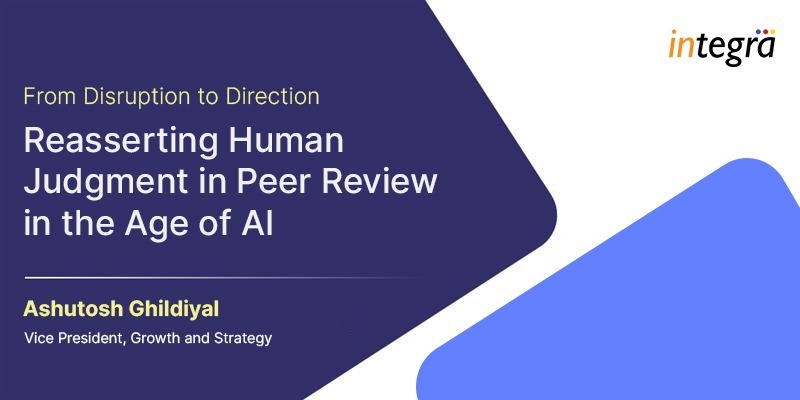Comprehensive Peer Review Management: Research Integrity and Editorial Excellence

In scholarly publishing, excellence is not just about what gets published, it’s about the process that gets it there. Peer review remains the foundation of research integrity, but the ecosystem around it is evolving rapidly. Today, publishers and societies must maintain rigor while adapting to increasing scale, speed, and complexity.
The stakes have never been higher. As submission volumes surge and misconduct becomes more sophisticated, the traditional peer review model, built for a smaller, slower publishing world, is showing signs of strain. Yet within this challenge lies opportunity: the chance to build more resilient, intelligent, and effective editorial systems that not only preserve quality but enhance it.
The Current Reality: A System Under Pressure
As we move through 2025, scholarly societies and publishers face converging challenges that test the limits of traditional peer review systems. These pressures are not merely operational inconveniences they represent fundamental threats to the integrity and sustainability of scholarly communication.
- Volume Overload: Submission volumes are growing at 8–12% annually across disciplines, creating backlogs and straining editorial teams to their limits. This growth isn’t slowing down. Emerging markets, interdisciplinary research, and increased global research activity continue to fuel unprecedented submission rates. Editorial teams designed for hundreds of submissions now handle thousands, often without proportional increases in resources or infrastructure.
- Complex Misconduct: Research misconduct has become increasingly sophisticated, with over 10,000 papers retracted in 2023 due to misconduct, requiring advanced detection tools and domain-specific expertise. Today’s bad actors employ artificial intelligence, sophisticated image manipulation, and coordinated networks to circumvent traditional detection methods. Paper mills have industrialized fraud, producing convincing but fabricated research at scale. The methods used to detect and prevent misconduct must evolve as quickly as the misconduct itself.
- Reviewer Shortage: A limited pool of qualified reviewers slows down manuscript assessments, with response rates declining and editorial workloads increasing. The global reviewer base is experiencing unprecedented fatigue. As submission volumes grow, the burden on experienced reviewers intensifies, leading to declining acceptance rates, longer review cycles, and compromised review quality. Early-career researchers, who could expand the reviewer pool, often lack the recognition or incentive structures to participate meaningfully in peer review.
- Resource Constraints: Many scholarly societies operate with lean staffing and limited budgets, juggling publishing with other mission-critical activities. Society publishers face a particularly acute challenge: they must balance their publishing operations with member services, conferences, advocacy, and other organizational priorities. Unlike commercial publishers, they often lack the infrastructure investment or economies of scale needed to address these challenges independently.
- Technology Gaps: Legacy editorial management systems struggle to keep pace with modern publishing demands. Many journals operate with workflows designed for print-era publishing, lacking the integration, automation, and intelligence needed for today’s digital-first environment. The result is manual processes, disconnected systems, and missed opportunities for efficiency and quality enhancement.
- Quality vs. Speed Tension: Publishers face increasing pressure to accelerate publication timelines while maintaining rigorous standards. Authors expect faster decisions, funders demand rapid dissemination, and competitive pressure drives journals to promise shorter review cycles. Yet quality cannot be compromised the challenge is achieving both speed and rigor simultaneously.
These trends have created a perfect storm, exposing the need for a new, strategic approach to peer review management. The traditional model of in-house editorial management, supplemented by basic freelance support, is no longer sufficient for the modern publishing environment.
Strategic Partnership: Rethinking Peer Review Support
Forward-thinking publishers are reframing peer review support not as outsourcing, but as strategic partnership. This shift represents a fundamental change in thinking: from viewing external support as a cost center to recognizing it as a strategic capability that enables growth, quality, and innovation.
The traditional outsourcing model often focused on cost reduction and task completion. Strategic partnership, by contrast, emphasizes value creation, capability enhancement, and shared success. It’s the difference between hiring someone to handle your backlog and partnering with experts who can help you build better systems, detect problems earlier, and position your journal for future success.
- The Partnership Mindset: Strategic partners become an extension of your editorial team, sharing your commitment to quality and reputation. They understand that their success is measured not just by tasks completed, but by the overall health and growth of your publication. This alignment creates incentives for continuous improvement, innovation, and proactive problem-solving.
- Capability Augmentation: Rather than simply taking on overflow work, strategic partners bring specialized capabilities that may be difficult or expensive to develop in-house. These include advanced research integrity tools, AI-powered screening technologies, specialized expertise in detecting sophisticated misconduct, and deep experience with complex editorial workflows.
- Scalable Excellence: Strategic partnerships provide the infrastructure to maintain quality standards while scaling operations. This means having systems, processes, and expertise that can handle volume fluctuations without compromising review quality or editorial standards.
What Modern Peer Review Partnership Delivers
- Editorial Control and Independence: Editorial boards retain full control over publishing decisions, with partners supporting the decision-making process rather than replacing it. This ensures that editorial vision, journal standards, and publication ethics remain firmly in the hands of subject matter experts and editorial leadership.
- Strategic Resource Allocation: Society staff focus on strategy, policy, and member engagement the high-value activities that only they can perform. By transferring operational tasks to specialized partners, internal teams can concentrate on innovation, community building, and long-term planning.
- Advanced Capabilities: Partners provide operational scale, technology, and integrity expertise that would be costly and time-consuming to develop internally. This includes access to cutting-edge detection tools, specialized training in research integrity, and experience managing complex editorial workflows across multiple journals and disciplines.
- Transparency and Accountability: Shared performance metrics enable transparency and continuous improvement, creating a feedback loop that benefits both partners and ensures alignment with publishing goals. Regular reporting, performance reviews, and collaborative planning sessions ensure that the partnership evolves to meet changing needs.
- Risk Mitigation: Strategic partners help journals navigate the complex landscape of research integrity, regulatory compliance, and reputational risk. Their specialized expertise and dedicated focus on these issues provide an additional layer of protection for publishers.
- Innovation Access: Partners often invest in research and development that individual journals couldn’t justify independently. This means access to emerging technologies, best practices from across the industry, and innovative approaches to persistent challenges.
The result is a more resilient, capable, and future-ready editorial operation that can thrive in today’s challenging publishing environment while maintaining the highest standards of quality and integrity.
Integra’s Comprehensive Service Portfolio
Integra offers expert-driven solutions to help scholarly publishers optimize workflows, ensure compliance, and uphold high publication standards across multiple service areas.
Core Peer Review Management Services
- Manuscript Assessment: Expert subject editors (Ph.D. and Master’s degree holders) evaluate articles for scope, plagiarism, ethical compliance, and adherence to reporting guidelines across science, technology, engineering, medicine, health, and social sciences.
- Peer Review Workflow Management: We oversee comprehensive peer review workflows, including manuscript verification, reviewer selection, editorial coordination, system configurations, and communication management.
- Reviewer Selection Assistance: Using cluster-based analysis and expert keyword curation, we identify credible reviewers to optimize manuscript submissions and ensure unbiased evaluations.
- User Database Administration: Services include batch email dispatch, bounce-back processing, updating deceased profiles, merging duplicates, and retaining primary profiles while maintaining and updating reviewer databases.
Advanced Editorial Support Services
- Special Issue Support: Our team assists with planning and managing special issues by vetting guest editors, aligning topics with journal objectives, and streamlining submissions.
- Transfer Desk Services: Integra’s Transfer Desk Services function as a centralized, global helpdesk supporting publishers in manuscript transfers across journals, providing comprehensive support from triaging transfer requests to facilitating handoffs and resolving queries.
- Customer Helpdesk Service: We provide dedicated customer support for managing email queries and calls, ensuring timely issue resolution and improved communication between authors, reviewers, and editorial teams.
- System Integration: Our team comprises experts skilled in major systems like ScholarOne, Editorial Manager, and others, enabling seamless workflow integration.
Research Integrity: Comprehensive Protection Services
Integra360 is our end-to-end research integrity audit solution, designed to help publishers maintain research quality and integrity.
Integra360: Comprehensive Integrity Audit
Core Detection Services:
- Duplicate submission detection, authorship verification, papermill identification, AI-generated text analysis, and ethical compliance reviews
- Enhanced plagiarism detection system that analyzes text overlaps in manuscripts, providing editors with actionable insights
- Citation manipulation detection, including excessive self-citations and coercive citation demands
Advanced Fraud Detection:
- Peer review manipulation detection by identifying fake identities, peer review rings, and unusual submission patterns
- Papermill detection including authorship changes, unusual activity patterns, data fabrication, and manipulated images or text
- Image screening services with expert forensic analyses of digital images such as micrographs and Western blots, detecting duplications, deletions, or alterations
AuthorPilot: AI-Powered Screening Technology
AuthorPilot, Integra’s AI-enabled manuscript screening tool, enables automated detection of image duplication, plagiarism, and authorship inconsistencies, serving as a sophisticated first line of defense for academic journals.
Key Capabilities:
- Automated screening for image and data anomalies
- High-confidence plagiarism detection with actionable insights
- Authorship inconsistency identification
- Integration with existing editorial management systems
Expert-Driven Analysis
Our hybrid approach combines advanced tools with subject matter expertise, ensuring compliance and providing comprehensive reports during peer review. Our team consists of highly qualified experts with extensive experience in ethics, data analysis, and peer review processes.
Measuring Success: Performance Metrics That Matter
Strategic partnerships require meaningful measurement beyond basic speed metrics.
Operational Performance
- Time to first editorial decision
- Reviewer acceptance and response rates
- Manuscript assessment accuracy rates
- Research integrity issue detection rates
- Transfer request processing efficiency
Strategic Impact Outcomes
- Society staff capacity for high-impact initiatives
- Reduced editorial backlogs and improved workflow efficiency
- Enhanced journal reputation through integrity compliance
- Successful implementation of new editorial programs
Future-Ready Publishing: Innovation in Action
The future of peer review demands smarter, not just faster, processes. Publishers must prepare for evolving standards and technological integration.
Enhanced Quality Standards
- Greater emphasis on reproducibility verification
- Transparent peer review workflow documentation
- Accelerated timelines without quality compromise
- Evolving author expectations for submission support
Technology Integration
- Technology-driven efficiency through advanced tools and workflows that streamline processes
- AI-enhanced screening tools that augment human editorial judgment
- Integrated manuscript management system capabilities
- Automated detection and flagging workflows
Why Publishers Choose Integra
- Proven Expertise: Our team comprises highly qualified experts with extensive experience in ethics, data analysis, and peer review processes.
- Comprehensive Solutions: We offer a full suite of services that address all aspects of research integrity and end-to-end peer review services tailored to meet the unique needs of scholarly journals.
- Technology Leadership: AuthorPilot serves as a sophisticated first line of defense for academic journals with cutting-edge research integrity capabilities.
- Trusted Partnership: We collaborate with publishers to uphold rigorous standards, fostering trust and credibility while maintaining editorial independence.
- Scalable Operations: From single-journal support to complex multi-title portfolios, our services adapt to your publishing needs and volumes.
Whether you’re managing submission backlogs, implementing comprehensive integrity checks, scaling editorial operations, or addressing complex research misconduct, Integra provides the expertise and infrastructure to make your peer review operations future-ready.
Ready to Transform Your Peer Review Operations?
The future of scholarly publishing belongs to organizations that balance tradition with innovation building resilient, scalable systems that uphold the highest standards of research integrity.
Integra’s expert-driven solutions support scholarly publishers in optimizing workflows, ensuring compliance, and upholding high publication standards.
Let’s make editorial excellence operational. Together.
Contact us to explore how strategic peer review partnership can address today’s challenges and position your publication for tomorrow’s opportunities.
Recent Blogs

Why LaTeX Still Matters in Scholarly Publishing—and How the Right Partner Makes All the Difference

Print, Pedagogy, and AI: The New Architecture of Educational Publishing



